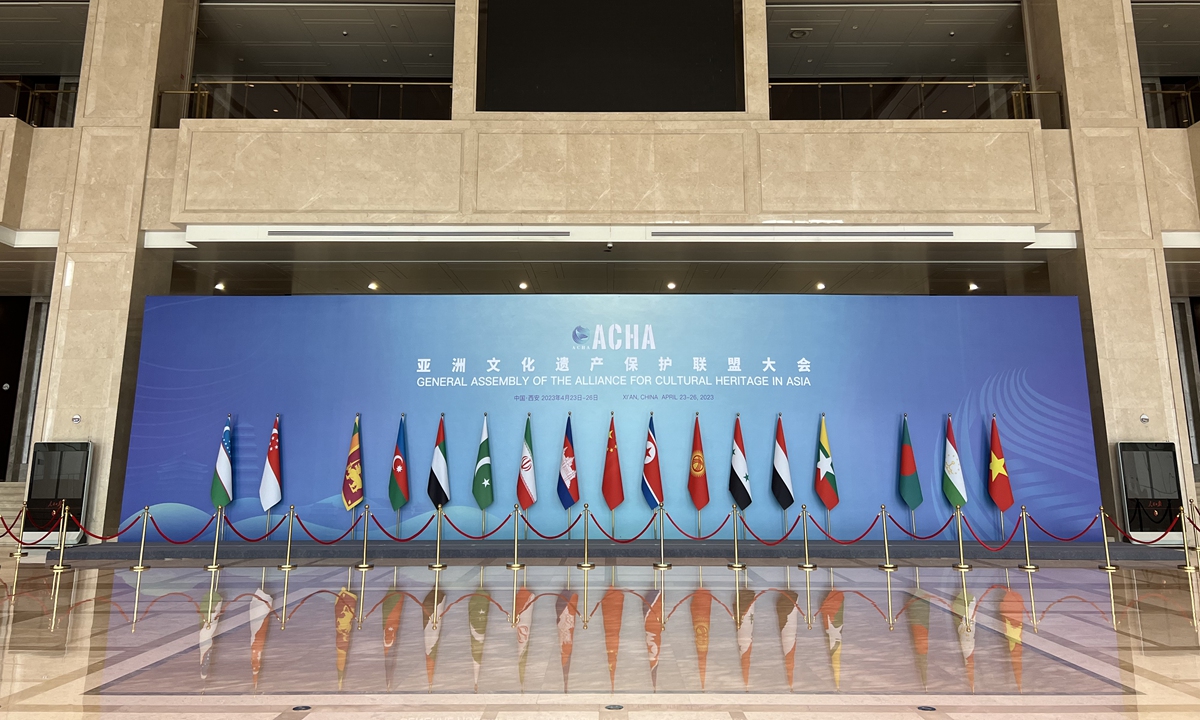ARTS / CULTURE & LEISURE
Asian heritage alliance strengthens cooperation
Xi'an Declaration aims to provide new approaches

Photo: Lou Kang/GT
The Alliance for Cultural Heritage in Asia (ACHA), an organization initiated by China, has been officially established at a Tuesday general assembly. The assembly also saw several key achievements, especially an agreement on a conclusive declaration that aims to provide solutions for worldwide cultural heritage protection from the perspective of Asian countries.
Chinese President Xi Jinping sent a congratulatory letter to the General Assembly of the Alliance for Cultural Heritage in Asia on Tuesday.
Within the framework of the alliance, China is willing to work with all Asian countries to strengthen experience sharing on cultural heritage preservation, promote international cooperation in the cultural heritage sector, and establish a network for dialogue and cooperation among civilizations, said Xi.
The assembly was held in Xi'an, capital of Northwest China's Shaanxi Province. The city is one of the most famous ancient capitals in China and an important link on the Silk Road, and now a pivotal city for the China-proposed Belt and Road Initiative.
China noted at the assembly that the country will engage in more cooperative cultural heritage projects by providing professional training and experience as well as high-end technology such as satellite remote sensing to Asian cultural heritage restoration and archaeology programs.
The Alliance for Cultural Heritage in Asia Xi'an Declaration is another international document that follows proposals including the 1994 Nara Document on Authenticity and 2021 Fuzhou Declaration. The goal of the Xi'an Declaration is to "provide an Asian approach to global cultural heritage conservation management," according to an announcement made at the ACHA General Assembly.
The declaration acts as a conclusion for major issues set to be covered by the ACHA in the future on subjects such as joint archaeology activities, multinational cultural relics restoration and cultural exhibitions.
The declaration echoes the Global Civilization Initiative proposed by Xi on March 15, which called for respecting the diversity of civilizations, advocating the common values of humanity, valuing the inheritance and innovation of civilizations, and strengthening international people-to-people exchanges and cooperation.
Initiated by China and joined by over 20 Asian countries, the ACHA is engaged in becoming an intergovernmental cooperation and exchange platform for implementing Asian cultural heritage activities.
Tuesday's assembly was the alliance's first large-scale high-level meeting, and participants included countries as well as three major international organizations: UNESCO, the International Centre for the Study of the Preservation and Restoration of Cultural Property and the International Alliance for the Protection of Heritage in Conflict Areas.
"Asia is an important birthplace of human civilization and has made indelible contributions to the development of world civilization," noted Li Qun, vice minister of Culture and Tourism of China and head of the National Cultural Heritage Administration.
"Preserving Asian cultural heritage is crucial in shaping the common future of Asia," Li said.
Li noted that China has played a positive role in cross country cultural heritage protection.
In the past decades, China has participated in 11 cultural heritage restoration programs in six Asian countries such as the restoration of Nepal's Basantapur Palace Complex. Additionally, China has carried out a total of 33 joint archaeological programs in cooperation with 19 Asian countries.
Li's also highlighted the importance the recovery and return of lost cultural relics among members of the alliance in his speech.
The inauguration ceremony for the Silk Road Collaborative Research Center for Archaeology, which aims to integrate Asian archaeological resources and professional training, was also held.
As a province in possession of nearly 50,000 immovable cultural heritage sites, Shaanxi has held many international cultural heritage forums.
In 2005, the International Council on Monuments and Sites held its 15th meeting in Xi'an to discuss the protection of the ancient buildings, ancient ruins and historical areas.
